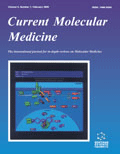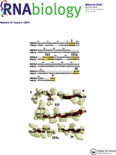
INTERNATIONAL JOURNAL OF MOLECULAR MEDICINE
Scope & Guideline
Advancing the frontiers of molecular medicine.
Introduction
Aims and Scopes
- Molecular Mechanisms of Disease:
The journal frequently publishes studies elucidating the molecular underpinnings of various diseases, including cancer, diabetes, cardiovascular disorders, and neurodegenerative diseases. This includes research on gene expression, signaling pathways, and cellular responses. - Therapeutic Strategies and Drug Development:
A significant focus is placed on novel therapeutic strategies and drug development, particularly in cancer therapy and regenerative medicine. This encompasses studies on small molecules, biologics, and advanced therapies such as gene editing and stem cell applications. - Role of Non-Coding RNAs and Epigenetics:
The journal showcases research on the regulatory roles of non-coding RNAs, including microRNAs and long non-coding RNAs, in gene expression and their implications in disease processes and therapy. - Immunology and Inflammation:
Studies related to the immune system, inflammatory responses, and their implications in diseases such as autoimmune disorders and cancer are prominent, highlighting the intersection of molecular medicine and immunology. - Translational Research:
The journal emphasizes translational research that connects laboratory findings with clinical applications, aiming to enhance understanding and treatment of diseases through innovative approaches. - Emerging Technologies:
The integration of novel technologies, including CRISPR, nanomedicine, and advanced imaging techniques, is a recurring theme, reflecting the journal's commitment to cutting-edge scientific advancements.
Trending and Emerging
- Role of Microbiome in Health and Disease:
Research on the human microbiome and its influence on health and disease is gaining momentum, particularly in relation to metabolic disorders, autoimmune diseases, and cancer. - Ferroptosis and Regulated Cell Death:
The exploration of ferroptosis and other forms of regulated cell death is becoming increasingly prominent, particularly in the context of cancer and neurodegenerative diseases, as researchers seek to understand and manipulate these pathways for therapeutic benefit. - Advanced Biomaterials and Regenerative Medicine:
There is a growing interest in the development of innovative biomaterials and their applications in regenerative medicine, including tissue engineering and wound healing. - Gene Editing and CRISPR Technologies:
The application of CRISPR and other gene-editing technologies is emerging as a significant area of research, with studies exploring their potential in treating genetic disorders and cancer. - Immunotherapy Innovations:
Immunological approaches, particularly novel immunotherapies for cancer and autoimmune disorders, are trending, with increased focus on understanding immune checkpoints and developing combination therapies. - Personalized Medicine and Genomic Approaches:
The journal is increasingly publishing research that focuses on personalized medicine, utilizing genomic data to tailor treatments to individual patients based on their unique genetic and molecular profiles.
Declining or Waning
- Traditional Pharmacology and Single-Agent Studies:
There has been a noticeable decline in studies focused solely on traditional pharmacological approaches and single-agent therapies, as the field increasingly moves towards combination therapies and personalized medicine. - Basic Mechanistic Studies Without Clinical Relevance:
Papers that focus exclusively on basic mechanistic insights without clear clinical implications or translational potential are appearing less frequently as the journal prioritizes research that bridges basic science with clinical applications. - Animal Models of Disease:
Research relying heavily on conventional animal models without addressing translational relevance is declining, as there is a growing emphasis on humanized models or more sophisticated in vitro systems that better mimic human pathophysiology. - Static Disease Models:
Studies employing static models of disease that do not incorporate dynamic or multi-faceted approaches are less common, as researchers favor more comprehensive systems that reflect the complexities of human diseases.
Similar Journals

International Journal of Biological Sciences
Pioneering Discoveries in Biological ResearchInternational Journal of Biological Sciences (ISSN: 1449-2288, E-ISSN: 1449-2288) is a premier open-access journal published by IVYSPRING INTERNATIONAL PUBLISHING since 2005, located in Australia. With a commitment to advancing knowledge in the life sciences, this journal covers a wide spectrum of disciplines, including Applied Microbiology and Biotechnology, Cell Biology, Developmental Biology, Ecology, Evolution, Behavior and Systematics, and Molecular Biology, earning a distinguished Q1 ranking in these fields as of 2023. It stands out with exceptional Scopus rankings, placing in the top ranks across multiple categories, such as the 98th percentile in Ecology, Evolution, Behavior and Systematics and the 94th percentile in Applied Microbiology and Biotechnology. The journal fosters an open access philosophy, ensuring that research findings are readily available to the scientific community and the public, and invites original research articles, reviews, and commentaries. With its mission to disseminate high-quality research, the International Journal of Biological Sciences serves as an essential resource for researchers, professionals, and students seeking to deepen their understanding and drive innovation in biological sciences.

MOLECULAR AND CELLULAR BIOLOGY
Bridging Knowledge Gaps in Molecular BiologyMOLECULAR AND CELLULAR BIOLOGY, published by TAYLOR & FRANCIS INC, stands as a preeminent platform for researchers, professionals, and students engaged in the dynamic field of molecular and cellular biology. Established in 1981 and ongoing into 2024, the journal features cutting-edge research that spans across vital sub-disciplines, garnering a strong impact in its contributions to the scientific community. With an impressive Q2 ranking in Cell Biology and Q1 ranking in Molecular Biology for 2023, it consistently publishes high-quality articles that reflect the latest advancements and discoveries within the field. The journal is particularly well-regarded for its rigorous peer-review process and commitment to scientific excellence, making it an invaluable resource for those seeking to deepen their understanding of molecular mechanisms and cellular processes. Although not open access, the journal offers diverse access options for researchers to reach the latest findings. By maintaining a strong focus on biochemistry, genetics, and molecular biology, MOLECULAR AND CELLULAR BIOLOGY remains essential reading for anyone looking to contribute to or stay informed about significant developments within this pivotal area of study.

Cancer Cell International
Championing Excellence in Cancer ScienceCancer Cell International, published by BMC, is a transformative open-access journal established in 2001, dedicated to advancing the field of oncology and cancer research. With its ISSN number not specified and an E-ISSN of 1475-2867, the journal proudly operates from the United Kingdom, located at CAMPUS, 4 Crinan St, London N1 9XW, England. Renowned for its rigorous peer-review process, Cancer Cell International has made significant strides, securing a Q2 ranking in Cancer Research and Q1 rankings in both Genetics and Oncology as of 2023. It ranks impressively in Scopus, featuring in the top quintile of Genetics (#37/347) and Oncology (#52/404), indicating its importance within the scientific community. The journal's broad scope caters to a diverse array of topics within cancer biology, making it an invaluable resource for researchers, professionals, and students seeking to stay at the forefront of cancer science. With a commitment to disseminating high-quality research, Cancer Cell International invites scholars to explore innovative findings and contribute to the collective effort of combating cancer.

CURRENT MOLECULAR MEDICINE
Bridging Research and Therapeutic StrategiesCURRENT MOLECULAR MEDICINE is a pivotal journal fostering advancements in the interdisciplinary fields of molecular medicine, biochemistry, and genetics. Published by Bentham Science Publishers, this esteemed journal has been disseminating vital research findings since its inception in 2001 and is continuously dedicated to exploring the molecular basis of health and disease. With a focus on translational research, CURRENT MOLECULAR MEDICINE provides an invaluable platform for researchers, healthcare professionals, and students, making significant contributions to the understanding of molecular mechanisms and therapeutic strategies. With an ISSN of 1566-5240 and an E-ISSN of 1875-5666, the journal holds a commendable position within the scientific community, being ranked Q3 in Biochemistry and Molecular Biology and Q2 in Medicine (miscellaneous) as of 2023. This journal does not currently operate on an open access model but remains accessible through various institutional subscriptions. The multidisciplinary scope covering molecular biology to medicinal applications positions CURRENT MOLECULAR MEDICINE as an essential resource for those striving to meet the challenges of modern healthcare and biomedical research.

RNA Biology
Pioneering Insights into Gene Expression and RegulationRNA Biology is a premier journal published by Taylor & Francis Inc, focusing on the intricate and evolving field of RNA research. With an ISSN of 1547-6286 and E-ISSN of 1555-8584, this journal has established itself as an essential resource for professionals, researchers, and students engaged in both molecular and cell biology. Recognized in the 2023 quartile rankings, RNA Biology holds a distinguished Q1 category in Molecular Biology and a Q2 category in Cell Biology, indicative of its significant impact and reputation within the scientific community. The journal emphasizes the importance of RNA in various biological processes, highlighting both fundamental and applied aspects, which is crucial for advancing our understanding of gene expression and regulation. With a strong Scopus ranking, including Rank #105/410 in Molecular Biology and Rank #83/285 in Cell Biology, RNA Biology is not just a publication but a vital platform for sharing groundbreaking findings and insights into RNA research. With a convergence that spans from 2004 to 2024, the journal promises to continue its legacy of excellence in disseminating important discoveries in RNA science, contributing richly to ongoing scientific dialogue and innovation.

JOURNAL OF MOLECULAR MEDICINE-JMM
Advancing the Frontier of Molecular Medicine.JOURNAL OF MOLECULAR MEDICINE (JMM) is a premier publication dedicated to advancing the field of molecular medicine, encompassing critical areas such as drug discovery, genetics, and biochemistry. Published by Springer Heidelberg in Germany, this influential journal has established its significance within the academic community, achieving an impressive Q1 ranking across multiple categories as of 2023, including Drug Discovery, Clinical Genetics, and Molecular Medicine. With a focus on publishing high-quality research and novel insights, JMM appeals to a diverse audience of researchers, professionals, and students passionate about the molecular underpinnings of health and disease. The journal, which has seen a convergence of relevant research spanning from 1976 to 2024, is instrumental in showcasing groundbreaking studies that push the boundaries of knowledge in molecular therapeutics and biomedical science. While it does not offer open access, the rigor of its peer-reviewed content ensures that each publication is a valuable addition to the scientific discourse surrounding molecular medicine. For comprehensive studies and reviews that highlight the intersection of molecular biology and clinical application, look no further than JOURNAL OF MOLECULAR MEDICINE.

Non-coding RNA Research
Pioneering Research at the Intersection of Genetics and MedicineNon-coding RNA Research, published by KEAI PUBLISHING LTD, is a leading open-access journal dedicated to advancing the field of non-coding RNA, a critical component in the landscape of molecular biology and genetics. Established in 2016, this journal aims to provide a platform for the dissemination of high-quality research focusing on the roles, mechanisms, and therapeutic potentials of non-coding RNAs in various biological processes and diseases. With impressive Scopus rankings placing it in the top quartile for both Biochemistry and Medical Biochemistry, as well as notable standings in Genetics and Molecular Biology, Non-coding RNA Research continues to attract contributions from globally recognized experts. The journal's commitment to open access ensures broad visibility and engagement with cutting-edge discoveries, thereby fostering an inclusive scientific dialogue that enhances understanding and innovation in this rapidly evolving field. For researchers and scholars, the opportunity to publish in a Q1 ranked journal not only validates their work but also enhances its impact, making Non-coding RNA Research an indispensable resource for anyone interested in the intricate workings of non-coding RNA.

BIOCHIMICA ET BIOPHYSICA ACTA-MOLECULAR BASIS OF DISEASE
Bridging Molecular Biology and Clinical InsightsBIOCHIMICA ET BIOPHYSICA ACTA-MOLECULAR BASIS OF DISEASE, published by Elsevier, is a pivotal journal in the fields of Molecular Biology and Molecular Medicine, recognized for its high impact factor and robust ranking within Scopus categories, holding prestigious quartiles in Q1 for both disciplines as of 2023. With ISSN 0925-4439 and E-ISSN 1879-260X, this journal fosters cutting-edge research from 1990 to 2025, addressing the critical molecular mechanisms underlying human diseases. Its wide-ranging scope includes original research articles, reviews, and advanced theoretical insights, serving as an essential resource for researchers, clinicians, and students alike. The journal is based in the Netherlands, at RADARWEG 29, 1043 NX AMSTERDAM, and while it does not currently offer an open-access option, it continues to maintain a strong presence in the scientific community, enhancing our understanding of molecular processes in health and disease.

FUNCTIONAL & INTEGRATIVE GENOMICS
Pioneering Discoveries in Genetics and Molecular BiologyFUNCTIONAL & INTEGRATIVE GENOMICS, published by Springer Heidelberg, is a leading journal in the fields of genetics and molecular biology. Established in 2000, it serves as a pivotal platform for advancing our understanding of genomic functionality and integration, making significant contributions to both basic and applied research in genetics. With a robust impact factor and a ranking in the Q3 quartile for Genetics and Q2 for Medicine (Miscellaneous), the journal aims to publish innovative research that explores the relationships between genomic data and biological functions, appealing to a diverse audience of researchers and professionals. Although it operates under a subscription model, the journal's extensive archives remain a valuable resource for academics seeking to stay abreast of the latest findings and methodologies in genomics. As the field evolves, FUNCTIONAL & INTEGRATIVE GENOMICS remains committed to fostering scholarly dialogue and the dissemination of groundbreaking studies that influence future research trajectories.

GENE
Connecting Researchers to Groundbreaking Genetic DiscoveriesGENE, an esteemed journal published by Elsevier, serves as a vital resource for researchers and professionals in the fields of genetics and medicine. With an ISSN of 0378-1119 and an E-ISSN of 1879-0038, this scholarly journal has been at the forefront of genetic research since its inception in 1976 and is set to continue until 2025. Situated in the Netherlands, GENE is recognized for its significant contributions, reflected in its Q2 ranking in both Genetics and Miscellaneous Medicine categories for 2023. This positioning within the Scopus rankings demonstrates its impact and relevance in a competitive field, where it holds the rank of #129 out of 347 in Genetics, placing it within the 62nd percentile. Although it does not offer open access options, GENE provides invaluable insight into contemporary genetic research, thereby fostering academic discussions and advancements. Researchers, professionals, and students alike will find GENE an essential platform for disseminating knowledge and exploring innovative developments in genetics and associated sciences.